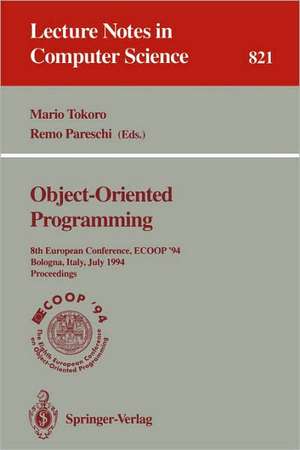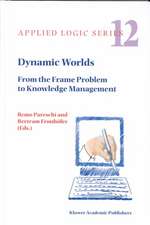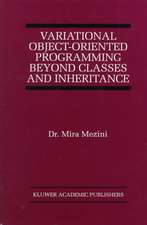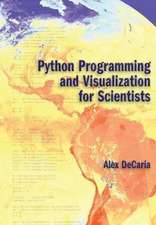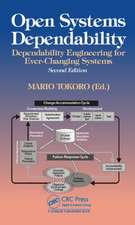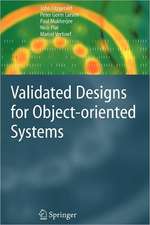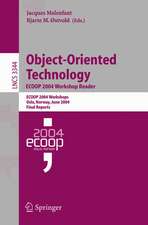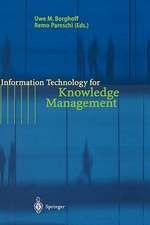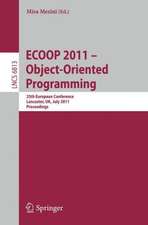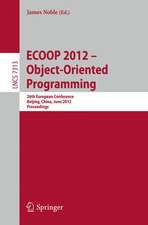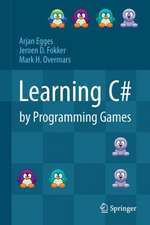ECOOP '94 - Object-Oriented Programming: 8th European Conference, Bologna, Italy, July 4-8, 1994. Proceedings: Lecture Notes in Computer Science, cartea 821
Editat de Mario Tokoro, Remo Pareschien Limba Engleză Paperback – 15 iun 1994
Din seria Lecture Notes in Computer Science
- 20%
 Preț: 1061.55 lei
Preț: 1061.55 lei - 20%
 Preț: 307.71 lei
Preț: 307.71 lei - 20%
 Preț: 438.69 lei
Preț: 438.69 lei - 20%
 Preț: 579.30 lei
Preț: 579.30 lei -
 Preț: 410.88 lei
Preț: 410.88 lei - 17%
 Preț: 427.22 lei
Preț: 427.22 lei - 20%
 Preț: 596.46 lei
Preț: 596.46 lei - 15%
 Preț: 448.04 lei
Preț: 448.04 lei - 20%
 Preț: 353.50 lei
Preț: 353.50 lei -
 Preț: 389.49 lei
Preț: 389.49 lei - 20%
 Preț: 309.90 lei
Preț: 309.90 lei - 20%
 Preț: 645.28 lei
Preț: 645.28 lei - 20%
 Preț: 763.23 lei
Preț: 763.23 lei - 15%
 Preț: 580.46 lei
Preț: 580.46 lei - 20%
 Preț: 310.28 lei
Preț: 310.28 lei - 20%
 Preț: 655.02 lei
Preț: 655.02 lei - 20%
 Preț: 1183.14 lei
Preț: 1183.14 lei - 20%
 Preț: 340.32 lei
Preț: 340.32 lei -
 Preț: 449.57 lei
Preț: 449.57 lei - 20%
 Preț: 591.51 lei
Preț: 591.51 lei - 18%
 Preț: 938.83 lei
Preț: 938.83 lei - 20%
 Preț: 337.00 lei
Preț: 337.00 lei - 20%
 Preț: 649.50 lei
Preț: 649.50 lei - 20%
 Preț: 607.40 lei
Preț: 607.40 lei - 20%
 Preț: 1414.79 lei
Preț: 1414.79 lei - 20%
 Preț: 1024.44 lei
Preț: 1024.44 lei - 20%
 Preț: 583.40 lei
Preț: 583.40 lei - 20%
 Preț: 453.32 lei
Preț: 453.32 lei - 20%
 Preț: 575.49 lei
Preț: 575.49 lei - 20%
 Preț: 1075.26 lei
Preț: 1075.26 lei - 20%
 Preț: 585.88 lei
Preț: 585.88 lei - 20%
 Preț: 825.93 lei
Preț: 825.93 lei - 17%
 Preț: 360.20 lei
Preț: 360.20 lei - 20%
 Preț: 763.23 lei
Preț: 763.23 lei - 20%
 Preț: 340.32 lei
Preț: 340.32 lei - 20%
 Preț: 504.58 lei
Preț: 504.58 lei - 20%
 Preț: 369.13 lei
Preț: 369.13 lei - 20%
 Preț: 580.93 lei
Preț: 580.93 lei - 20%
 Preț: 343.62 lei
Preț: 343.62 lei - 20%
 Preț: 350.21 lei
Preț: 350.21 lei - 20%
 Preț: 583.40 lei
Preț: 583.40 lei - 20%
 Preț: 583.40 lei
Preț: 583.40 lei - 15%
 Preț: 438.59 lei
Preț: 438.59 lei - 20%
 Preț: 341.95 lei
Preț: 341.95 lei - 20%
 Preț: 238.01 lei
Preț: 238.01 lei - 20%
 Preț: 538.30 lei
Preț: 538.30 lei
Preț: 345.26 lei
Preț vechi: 431.57 lei
-20% Nou
Puncte Express: 518
Preț estimativ în valută:
66.07€ • 71.75$ • 55.50£
66.07€ • 71.75$ • 55.50£
Carte tipărită la comandă
Livrare economică 22 aprilie-06 mai
Preluare comenzi: 021 569.72.76
Specificații
ISBN-13: 9783540582021
ISBN-10: 3540582029
Pagini: 556
Ilustrații: XII, 544 p.
Dimensiuni: 155 x 235 x 29 mm
Greutate: 0.77 kg
Ediția:1994
Editura: Springer Berlin, Heidelberg
Colecția Springer
Seria Lecture Notes in Computer Science
Locul publicării:Berlin, Heidelberg, Germany
ISBN-10: 3540582029
Pagini: 556
Ilustrații: XII, 544 p.
Dimensiuni: 155 x 235 x 29 mm
Greutate: 0.77 kg
Ediția:1994
Editura: Springer Berlin, Heidelberg
Colecția Springer
Seria Lecture Notes in Computer Science
Locul publicării:Berlin, Heidelberg, Germany
Public țintă
Professional/practitionerCuprins
Beyond objects.- Should superclasses be abstract?.- Roles and dynamic subclasses: A modal logic approach.- Methods as assertions.- Abstracting process-to-function relations in concurrent object-oriented applications.- Typed concurrent objects.- Atomic object composition.- Patterns generate architectures.- Meta patterns — A means for capturing the essentials of reusable object-oriented design.- Modeling object-oriented program execution.- Putting objects to work: Hypermedia as the subject matter and the medium for computer-supported cooperative work.- Object-oriented computations in logic programming.- Deductive object databases.- Declarative object-oriented programming: Inheritance, subtyping and prototyping.- Constraints and object identity.- Protection in the Guide object-oriented distributed system.- Object location control using meta-level programming.- Customising object allocation.- Combining object-oriented analysis and formal description techniques.- A specification language for object-oriented analysis and design.- Real-time specification inheritance anomalies and real-time filters.- Efficient dynamic look-up strategy for multi-methods.- Taming message passing: Efficient method look-up for dynamically typed languages.- Generalizing dispatching in a distributed object system.- A geographic environmental modeling system: Towards an object-oriented framework.- Adding digital video to an object-oriented user interface toolkit.- Product configurations — An application for prototype object approach.
Caracteristici
Includes supplementary material: sn.pub/extras
